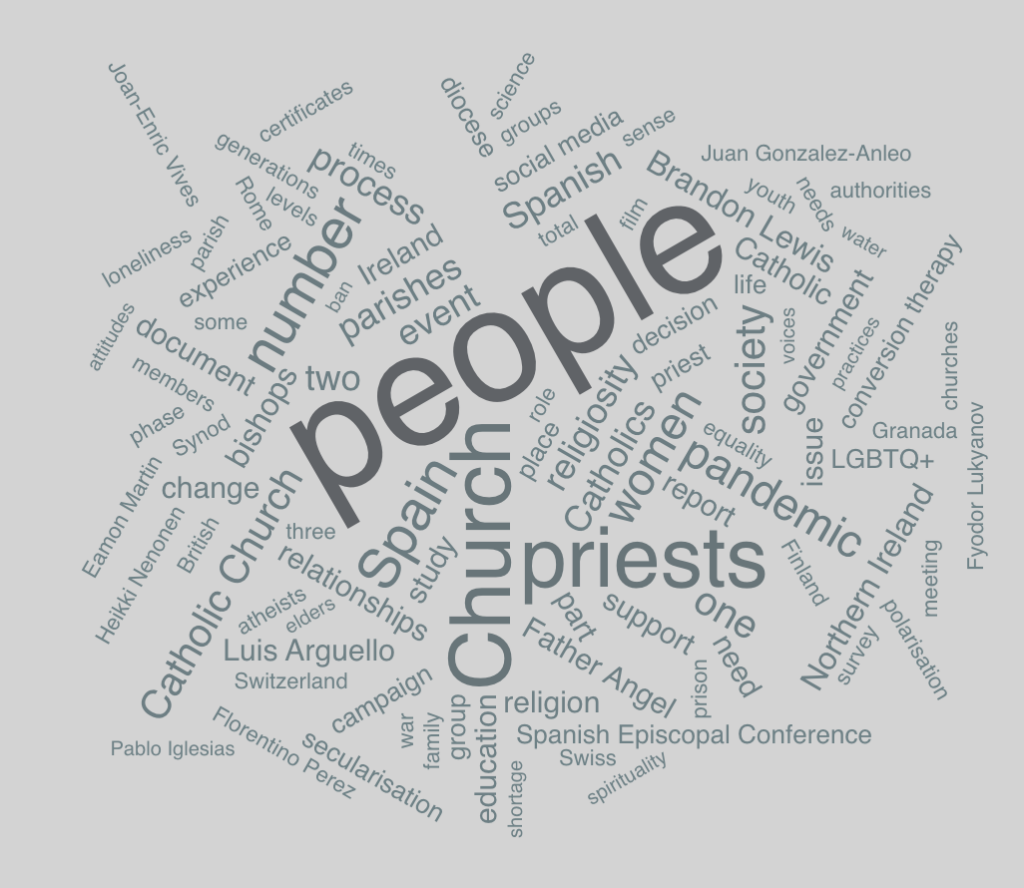How churches are failing to reach a younger audience
How churches are failing to reach a younger audience
The religiosity of younger generations is declining. How can churches reach a younger audience, while not forgetting about their older followers?
The EARS dashboard is a collection of summaries from European news articles on religion and society. By using the various tools the dashboard offers, like word clouds and timelines, we can gain new insights into which role religion plays in today’s societies.
At the time of writing, 2,711 summaries were added to the dashboard in the last year. To structure our search, we’ll use the filters in the dashboard, where topics and global developments can be selected. Topics can be subjective and are shaped by the EARS context. They allow us to focus on certain themes and issues that are currently important. Global developments are objective and universal. They play an important role across industries and countries.
By selecting the global development generational conflict, 41 articles result from our search, as shown below. This means that from the 2,711 articles added to the dashboard last year, 41 were tagged with the global development generational conflict.

A quick overview from the dashboard
By looking at some of the tools provided by the dashboard, first trends related to generational conflict already emerge. For example, the word cloud shows us that priests, Spain, and the pandemic are regularly mentioned in our selection of articles.

Then, the timeline shows that every month, usually between 0% to 3% of articles on the EARS dashboard relate to the global development of generational conflict, with a peak of 5% in August 2021.

Weakening religiosity among younger generations
The dashboard also provides an overview of all summaries resulting from our search. From this, we can see that in the European media on religion and society, generational conflict is mainly illustrated by the differences between younger and older generations in terms of Christian religiosity.
For example, Polish society is rapidly secularising – particularly among younger generations. According to polling by the CBOS institute, 84% of Poles state they are Catholic and 42% say they are practising. However, this number falls dramatically among 18-24-year-olds, with just 23% saying they are practising. This number was at 69% in 1992.[1] [2] A similar trend is seen in Sweden, where mainly the younger generation has been found to be non-religious in the country’s secularising society.[3]
Religion is “not at all” important
In Spain, 47.9% of young Spaniards say religion to “not at all” be important. For just 10.6% it is “very important,” and only 3.9% believe that important things are said in churches.[4] The pandemic is said to have accelerated the process of secularisation in the country.[5] In two years, the number of agnostics and atheists increased by almost 10 percentage points: from 27.5% in 2019 to 37.1% in 2021. One of the main causes for this rise was the increasing number of agnostics and atheists in the age group below 34 years, where 56.2% described themselves as such. This figure even reaches 63.5% for 18-24-year-olds.[6]
Failure to reach a younger audience
Several reasons lead to this decline in religiosity in younger generations. For example, experts say the Church has failed to “move with the times.” It has also suffered scandals relating to sexual abuse and accusations of interlinkage with political authorities. Some young people state they dislike the Church’s views on LGBT people.[7] Moreover, young people are more concerned about other issues, like the environment. In addition, churches have failed to reach a younger audience through social media.[8]
Countering the trend
However, there might be hope for some churches. For example, a survey in Belgium showed that there is a desire among young people to participate in the Flemish Church. A clear majority responded that it wants a Church that listens to them and enters into dialogue with them.[9] Similarly, in a UK survey conducted at the end of 2021, two-thirds of the respondents between 18 and 34 years old said they wanted to celebrate Christmas in a Church that year. Those interviewed declared they experienced Christmas as a time of hope and joy.[10]
Learn more on the EARS dashboard
The EARS dashboard allows you to gain insights into a large number of topics, including generational conflict. It is a free tool that allows you to make connections like those described above, and to find out about relationships between interesting subjects across Europe. Please visit the dashboard to learn more.
Anne Kamsteeg-Clerx
Sources
[1] Young Poles abandoning ‘frozen’ Catholic Church
[2] Pandemia osłabiła religijność Polaków. Wyniki badania – Dziennik.pl
[3] Swiss population secularises more and more
[4] Los jóvenes españoles creen más en Tik Tok que en los curas
[5] La pandemia aceleró el proceso de secularización en España
[6] La pandemia aceleró el proceso de secularización en España
[7] Young Poles abandoning ‘frozen’ Catholic Church
[8] Los jóvenes españoles creen más en Tik Tok que en los curas
[9] Een jongerenraadpleging met wrange conclusies: ‘Vlaamse Kerk neemt jongeren niet serieus’ – Katholiek Nieuwsblad
[10] Britse jongeren willen Kerstmis in de kerk vieren | Kerknet






